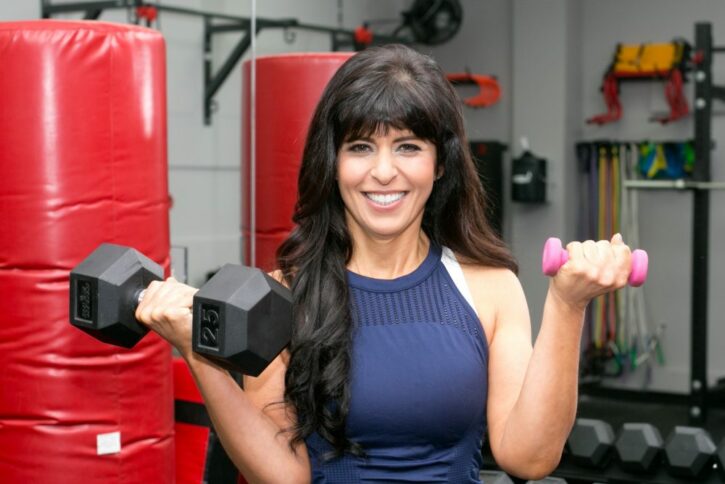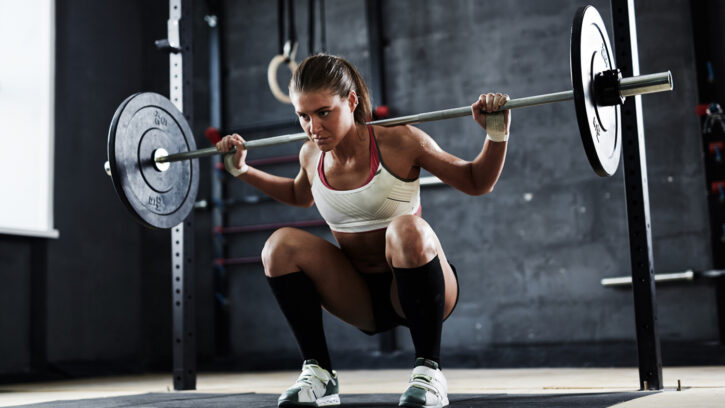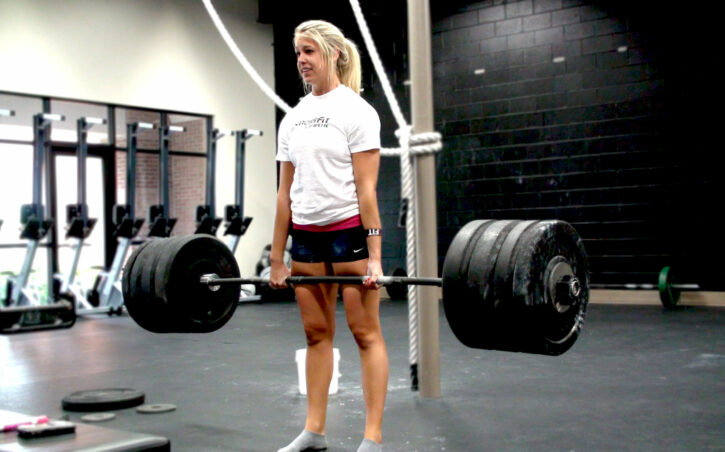Lifting Light vs. Heavy Weight: Is one better than the other? Choosing a weight to work out with isn’t black or white – here’s what you should know.
When it comes to working out, there’s a lot of information out there about if you should or not — and it can get pretty confusing, fast. Some people opt for heavyweights when they want to achieve more visible muscles or “bulk” up, and some people are afraid to lift heavy weights for that exact reason.
Unfortunately, many women still believe the myth that lifting heavy weights will give them bulky muscles, so they choose light or no weights that promises “long, lean muscles” instead.
But is any of this information even true? (not really). Choosing the right weight for you to lift is all about how you’re working out, not the number on the dumbbells.

It all comes down to reps.
People lift weights intending to make their muscles stronger (and, for some, to get those bulky biceps or lean-looking arms). Those looking to develop large muscles will likely opt for a heavier weight, while people who want to stay lean will stick to something smaller.
The truth is, there’s no correct strategy – both are valid choices. By lifting heavy dumbbells, kettlebells, and barbells, you will undoubtedly make you stronger. But lighter weights can help you get stronger too – it just may take you a bit longer.
It all comes down to one crucial factor: muscle fatigue. This means that your workouts’ goal should be to work your muscles to the point of fatigue (i.e., when you can no longer do another rep) no matter how much weight you are using. So whether you are doing five dumbbell curls with a 20-pound weight, or 20 reps with a 5-pound weight, as long as you are getting to the point of muscle fatigue, you’ll get stronger.
And science backs this up. A 2010 study [1] found that a group of men who lifted heavyweights to the point of “failure” or muscle fatigue gained the same amount of muscle and improved their strength as much as the other group that lifted lighter weights for more reps. This study [2] in 2016 found the same results.
Some workouts that you might do that use light weights include a barre class, yoga sculpt, Pilates, or “sculpting” classes. Or a light-weight workout may look like doing bicep curls with a lighter weight (like say 8-10 pounds) until you can’t lift any more with good form. On the other end of the spectrum is doing squats with an Olympic barbell, which will fatigue your muscles after only a few reps.

The benefits of lifting lightweights
Using lighter weights can help you build muscle – it just may take longer to get results. What are some of the reasons you may choose to lift lightweights over heavy?
If you’re new to working out or starting a new fitness program, lightweights may be the right choice. Someone may choose to train with less resistance when they are learning the form of new exercises. Then once they get the form down and feel comfortable, they can increase the resistance.
You can also consider that lightweights are an excellent option for reducing the risk of injury – you’re just less likely to hurt yourself using a 5-pound weight over, say, a 50-pound weight.
You can also bring lightweights into other types of workouts to add more resistance and keep your heart rate up. For example, in some dance cardio classes, you can do dance routines while also holding a 2- or 3-pound weight, which adds resistance and makes the cardio workout harder. By the time you finish the dance, your arms feel like they can’t hold the 3-pound weights – let alone anything more substantial.
That said, lifting heavy has its own set of benefits and can increase the challenge if that’s what you’re looking for in your workout routine.

What are the benefits of working out with heavier weights?
If you’re looking to gain muscle and increase your strength in the most efficient way possible, lifting heavy weights is a good option. Gaining strength all comes down to muscle fatigue, and heavyweights will get you there faster. It just takes longer to get tired when you’re curling a 5-pound weight versus a 25-pound dumbbell. Heavy compound exercises offer the most bang for your buck. You can use the heaviest load possible and work more muscles in less time, making them efficient and advantageous for weight loss.
And if you’re looking for more cardio in your routine, you can do that with heavy weights if you’re strategic about your weight-training workouts. You can even perform the exercises circuit style in a row and get the added benefit of conditioning work all in one.

How do you know when you should lift heavier?
It’s a smart idea to start lifting heavier weights slowly and at your own pace. So say you’ve been working out for a while, and the 5-pound weights aren’t working anymore. What should you do? Go more substantial, of course; make sure you move at your own pace.
Accordingly, it would be best to work your way up slowly over time and always try to challenge yourself. No matter what rep range you’re lifting in for your working sets, the last one or two reps should be a severe challenge and struggle. If it is not, then you know you need to increase the resistance.
Lifting Light vs. Heavy Weight Summary
All science and trainer advice aside — the most important thing about your fitness and workout routine is that you’re doing something consistently. And the chances are that’s the most fun and engaging workout for you, no matter what kinds of weights you use.
I hope you found this article helpful and informative. If you have anything you would like to share or any opinions about my website, please speak up. I look forward to your comments, questions, and the sharing of ideas.
Disclaimer: I am not a personal trainer or a healthcare professional. The information contained in this article is for educational and informational purposes only. It is not intended as health or medical advice. Always consult a physician or other qualified health provider regarding any questions you may have about a medical condition or health objectives.
Related articles:
References:
1. https://www.sciencedaily.com/releases/2016/07/160712094259.htm
2. https://www.physiology.org/doi/full/10.1152/japplphysiol.00154.2016
You are an essential myth buster here with what you have written here because I didn’t think that there was any reason why anyone would want to go for something light at the gym. Still, they seemed to use it, and I thought it was for those people who just wanted to lose weight, but now that you say this, I know that those who want to build muscle mass can use it as well.
Good post. I enjoyed the reasoning behind it all! I also know that confusing your body and changing up the routine on occasion is very, very good for muscle gain, weight loss, and overall fitness. It sounds funny, but our body can get used to the same exercises week after week. I like that you advise to push yourself safely so you can continue to improve!
I enjoyed your post.
John
Hello John,
Thanks for your input. Remember, we can all safely improve our bodies. SAFETY always comes first.
Warmest regards,
Robert
Hello Robert, many of us do not have a routine, and that is where the main problem starts. We don’t know which weight to lift. I think what you’re saying is that lifting either lightweight or heavyweight gives you the same result. Except for lifting lighter weight might take longer to achieve the result. I have always been going with the heavy lifting, and it’s been cool for me. Thanks for the read.
Hi Justin,
That’s exactly what I am talking about. The weight that’s being lifted is just a number. The important thing is that you are lifting. Its true lifting lighter weights will take longer to achieve the same result as lifting heavier weight. Nonetheless, in time you will achieve the results you want.
All the best,
Robert